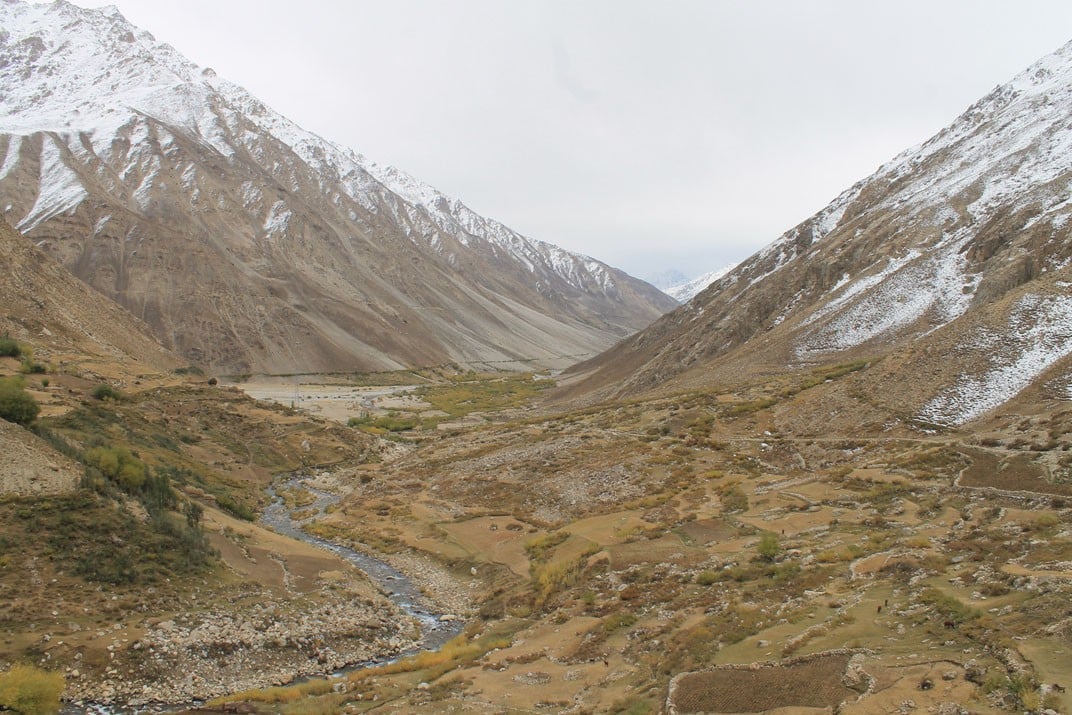
Getting to the border village of Shah Siddim and listening to the glorious tales of Badakhshan

Far off the relative hustle and bustle of Chitral city, straddling the border with Badakhshan province of Afghanistan, lies a border village called Shah Siddim. In common parlance, one will hear Shah Saleem, for both sound pretty similar, and the locals prefer not to bother with registering all the rectifications. It lived once, they tell. It lives still, one can see. But times have changed, and like always, the past was shining, and the present is poor.
Getting to Shah Siddim is one of the harder bits. Sited hardly sixty kilometers off the city, it takes us four gruelling hours on rough, bumpy and rocky country roads just to get to Shah Siddim. As we pass Garam Chashma (Hot Springs) on the way to Shah Siddim, we get to see a lively bazaar adorning both sides of the road. This is the furthest for the common tourist they say, for in one day people don’t take the trouble of travelling much further.
As we leave the bazaar in Garam Chashma, the road starts constricting. Meandering between boulder strewn hill sides, I have a hard time steering the vehicle, and so I have to switch to four wheel drive mode. The road is plenty uncomfortable if there can be such a thing, with not a head on crossing to be found for hundreds of metres at a stretch. As we draw closer to the river streaming in the bed below, I find a fine serenity in the air.
The world en route Shah Siddim is dynamic, again I am told. Just as we pass a narrowly carved out stretch of road on a ledge, I’m shown Parabeg, a village across the river. People here speak a language separate from Khowar, the local lingua franca. It is hard to imagine how such a diversity of people could have settled here in the middle, but then again Chitral is quite the linguistic melting pot. Over fourteen languages are spoken here. Hard as it may be to believe, I myself am witness to Khowar, Wakhi, Pashto, Gujari, Kalashi, Dari, Nuristani and at least three other languages being spoken that I can’t name presently.
Having left town early, we reach Shah Siddim well in time. Shortly before the main village, on a slight rise in the hills, I notice a foul pinching smell in the cool breezy air we’re breathing. It’s another Garam Chashma, except that it’s not in Garam Chashma. The smell of sulphur is unmistakable, as is also the warmth that is emanating from the spring.
Shortly thereof, at the local Levies post, we are greeted by a strange-looking face perched on a tall boulder. Closer inspection reveals it to be a small rock mimicking a man’s face, complete with a nose, eyes and other features, albeit old ones. In a world of rocks, and nothing but rocks, this for sure is a worthy find!
As I stand here, enduring the chilling breeze brought on by the clouds in the sky, I glance a series of streaks zigzagging on the mountain due west. Upon inquiry, the Subedar begins to narrate of the glorious times gone by. These lines, he says, are remnants of a road that once climbed up the next few mountains crossing over into Badakhshan. In the good old times, this road was truck-able, and cargo would go to Afghanistan from here. On the way back would come a treasure trove of handmade rugs, goats and sheep of the finest herds and rough gemstones, freshly excavated and waiting to adorn markets around the world.
Crossing over boundaries at an altitude of fifteen thousand feet above sea level, there used to be hotels, lining the bustling highway, offering exotic meats for the holy men who would sojourn here. The name was Top Khana, as they would call it after the cargo that would traverse. Stories are also told of a lake a few hours inside Badakhshan where trout would abound. What they forget to tell is that in all probability trouts must have also been abundant in the Lutkoh River at those times. It is only when men grew greedy that the use of fishing nets and explosives destroyed our river ecosystems.
As we stand here speaking of the glorious old days, the clouds start drawing closer and the wind is becoming gustier. Ill prepared for the untimely cold, we retreat to the house of the Subedar, where he orders for us Turup Chai, or the local salty version of tea. Awaiting the treat, I inspect the rug that adorns the room; an old exquisite Bukhara, gleaming with a sheen that is witness to the countless days and nights of hard human labour that went into its making. Just like the trouts, the abundance of Afghan rugs in Shah Siddim reminds of better times.
There is just one question that I am asked here, over this delicious cup of tea. Will such ever come to be again, I am queried by the people of Shah Siddim. It is a question to which though, even I have no answer.